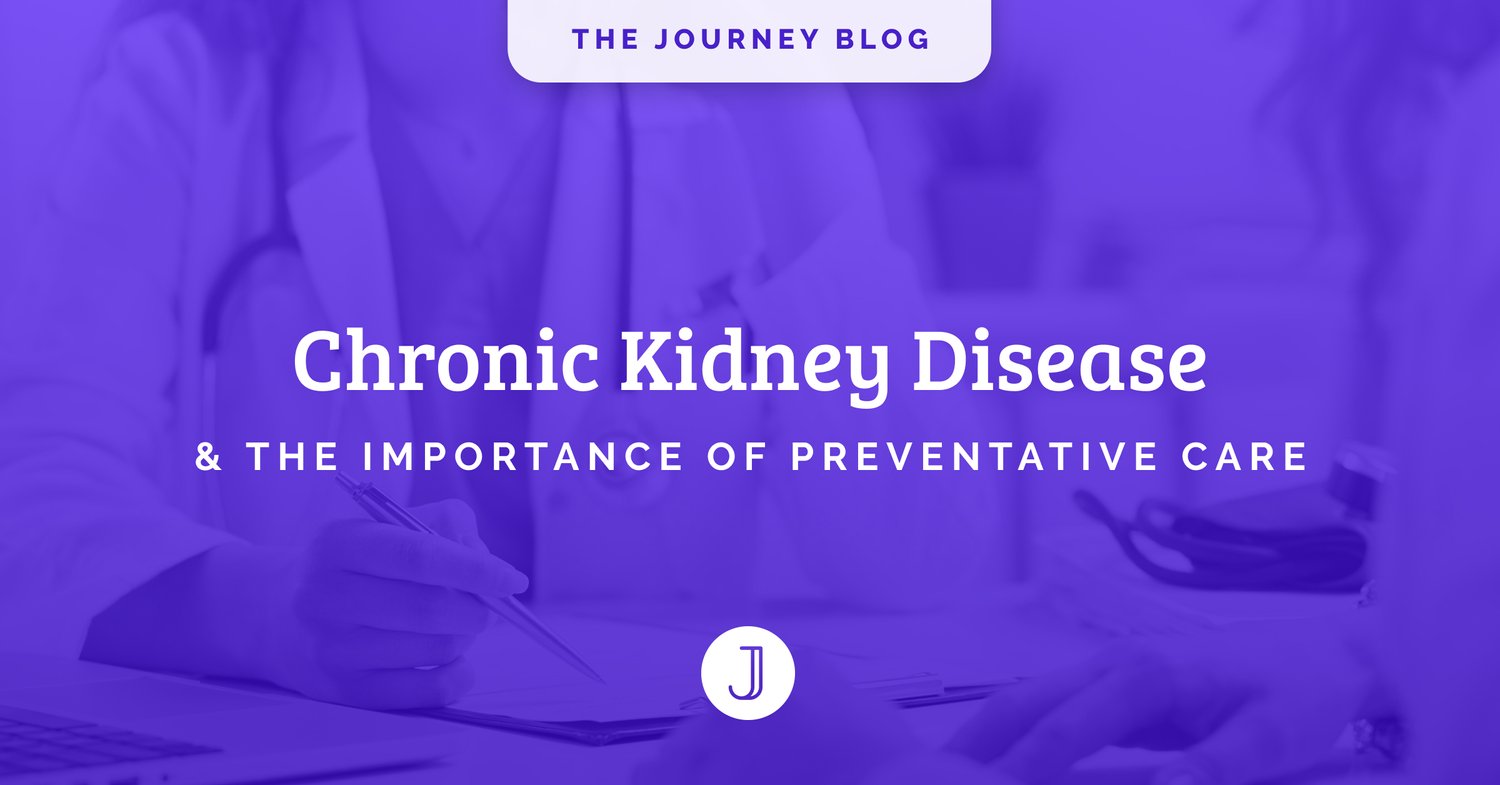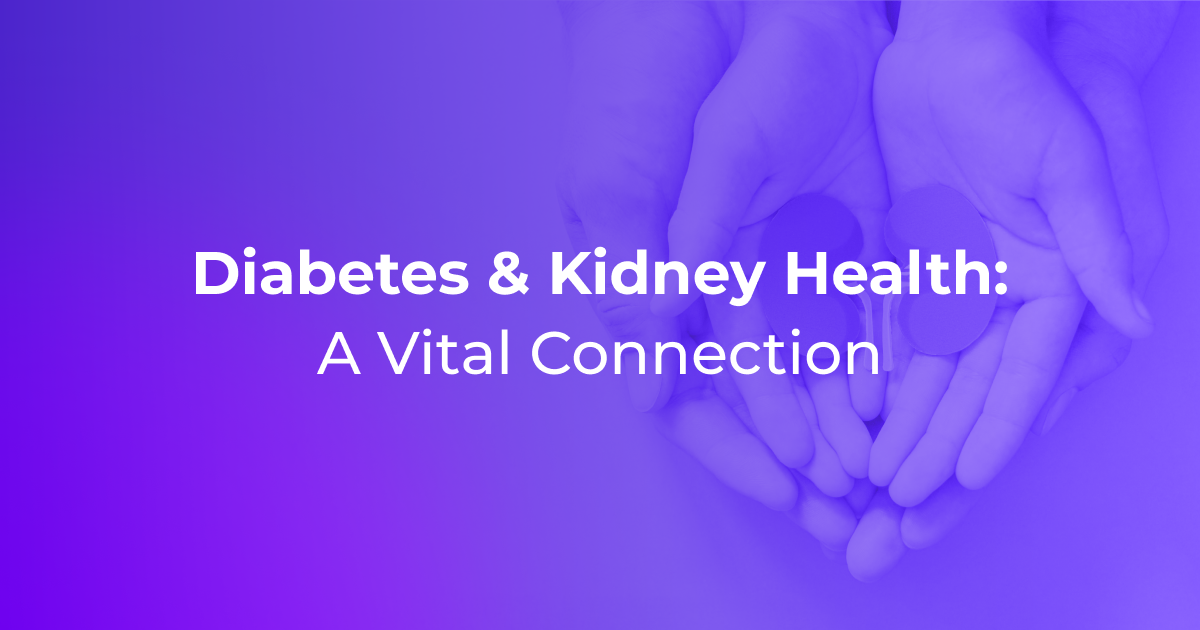Chronic Kidney Disease: What You Should Know
Far from being a rare occurrence, 30% of people with type 1 diabetes and as many as 40% with type 2 diabetes are expected to experience kidney failure in their lifetime. In the United States, diabetes is the leading cause of kidney failure, also known as end-stage renal disease or ESRD.
Despite its prevalence, chronic kidney disease (CKD) is relatively silent and difficult to detect until damage has already occurred in the body. In this blog, we discuss how CKD is currently diagnosed, managed, and treated, as well as how we are working to improve it.
Kidney Function and Failure
The kidneys eliminate waste and excess fluids from the body by filtering the blood and transforming waste into urine. By doing so, they help regulate the amount of salt and minerals in the body. In addition, the kidneys produce hormones that regulate blood pressure, make red blood cells, and keep bones strong.
The deterioration of kidney function—leading to CKD—usually happens over the course of several decades. Most of the time, there are no obvious symptoms during that period. The symptoms that do appear aren't readily associated with diminished kidney function. Checking kidney function early and often is essential.
Common symptoms of kidney problems include:
-
chest pain
-
feeling tired
-
headache
-
changes in the amount of urine produced
-
muscle cramps
-
nausea
-
shortness of breath
-
weight loss
-
anemia
-
bone disease
-
malnutrition
Edema, the swelling of the body due to a buildup of waste and water retention, is often the first obvious indicator of CKD. However, by the time edema is present, significant kidney damage has already occurred.
Chronic kidney disease disrupts every aspect of the cardiovascular system. Along with causing kidney problems, CKD also increases the likelihood of stroke, heart attack, and high blood pressure. As kidney failure progresses, the person experiences ESRD and the catastrophic health consequences that come with it. If left untreated, CKD results in death.

Managing Kidney Health After a CKD Diagnosis
There is no cure for CKD, but by strictly managing one's health and taking medication(s), it is possible to slow disease progression and preserve kidney function.
Managing kidney health (before and after a CKD diagnosis) involves the following:
-
Managing blood pressure, blood glucose, and cholesterol levels
-
Consistently taking all medications as prescribed
-
Strictly following use instructions for OTC medications known to affect the kidneys, especially pain relievers and anti-inflammatories
-
Adopting dietary habits that limit protein, sodium, and potassium, and keeping cholesterol levels in check
-
Being physically active
-
Not smoking
-
Limiting alcohol intake
-
Managing stress
There are a number of medications that give some benefit for managing CKD. These medications include:
-
SGLT2 inhibitors and GLP1 receptor agonists which provide some protection to the kidneys along with reducing blood glucose levels
-
ACE (angiotensin-converting enzyme) inhibitors or ARBs (angiotensin receptor blockers) to lower blood pressure
-
Diuretics to eliminate extra fluid from the body
-
Cholesterol-lowering medications
-
Erythropoietin which builds red blood cells and prevents anemia
-
Vitamin D & calcitriol to prevent bone loss
-
Phosphate binders to eliminate excess phosphate from the body
The preventative care recommendations in these standards include:
-
Actively managing blood glucose (BG) levels
-
Actively managing blood pressure (BP) levels
-
Limiting salt & sodium intake
-
Being physically active
-
Managing your bodyweight
-
Getting enough rest
-
Stop smoking
-
Taking medications as prescribed
-
Managing stress, anxiety, and depression
Treating Kidney Failure
Ultimately, CKD is a progressive disease. Over time, the kidneys become more damaged and gradually lose their ability to function properly. When a person reaches Stage 5 CKD, their kidneys are very close to failing or have already failed. This makes it impossible for them to filter waste and fluid from the body. At this stage, the only effective treatments are dialysis or a kidney transplant.
Dialysis replaces some kidney function, but not all. Dialysis patients must not only undergo treatment for up to four hours several times a week, but also adhere to a strict diet and health regimen.
While a kidney transplant places a healthy kidney in the body, it is not a cure. After receiving the transplant, the person needs to take daily medications to prevent their body from rejecting the transplanted kidney. They must also strictly maintain their diet and health habits.

Measuring Kidney Health: Current Practice
There are several ways to determine the current state of kidney function.
The kidneys can be examined using an ultrasound, MRI (magnetic resonating imaging) or CT (computerized tomography) scan. A biopsy of the kidneys can also be performed, which is the most invasive test, requiring a physical sample of the kidney to be collected and examined.
More commonly, a combination of blood (eGFR) and urine (uACR) lab tests are used as an annual screen.
eGFR (estimated glomerular filtration rate) measures kidney function based on a blood sample. It measures the amount of creatinine, a waste product that comes from muscle tissue. From this result, the GFR is calculated using a mathematical formula, indicating the current level of kidney function.
uACR (urine albumin to creatinine ratio) measures the amount of albumin, a protein, present in a urine sample. The presence of albumin in the urine points to kidney damage.
Together these two tests give an assessment of a person’s current level of kidney health.
Improving How We Monitor Kidney Health
No matter the method, current screening techniques identify a person's risk for kidney disease after kidney damage has already occurred. Tragically, for some, this means that a diagnosis comes at a much later stage and they are already facing the need for dialysis.
What if we could look ahead to measure the likelihood of developing kidney problems in the future? By predicting such risks earlier, we could take proactive steps to prevent kidney issues before they occur.
We’re committed to making this shift a reality. NaviDKD, our flagship screening, is a biomarker-based blood test designed to identify patients at an increased risk of developing diabetes-related kidney disease earlier than ever before. By analyzing predictive biomarkers, the test provides a 10-year risk score for the development or progression of CKD, along with personalized treatment options to preserve kidney health and avoid disease progression. By enabling early detection and intervention, NaviDKD supports a more proactive approach to kidney health.

About Journey Biosciences
Journey Biosciences is on a mission to improve the lives of people with diabetes through proactive, personalized care. One in three people with diabetes faces the hidden threat of kidney disease. Our flagship solution, NaviDKD®, is an innovative blood test that identifies this risk years in advance, enabling personalized preventive care for better health outcomes. By empowering early action, we aim to significantly reduce the burden of diabetes-related kidney disease on patients and healthcare systems. Discover more at journeybio.life.
For media inquiries: media@journeybio.life



